| Listing 1 - 8 of 8 |
Sort by
|
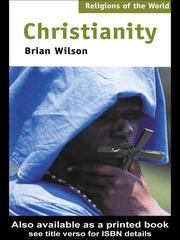
ISBN: 1134617305 1280108940 0585447829 0203519124 9780585447827 9780203519127 9780415213424 0415213428 9780415211611 0415211611 0203547071 9780203547076 9786610108947 6610108943 9781134617302 9781280108945 Year: 1999 Publisher: London Routledge
Abstract | Keywords | Export | Availability | Bookmark
 Loading...
Loading...Choose an application
- Reference Manager
- EndNote
- RefWorks (Direct export to RefWorks)
Christianity is a concise and readable survey of the history of Christianity. Focusing particularly on the modern period, it provides a valuable introduction to contemporary Christian beliefs and practices.
Christianity. --- Religion. --- history of Christianity --- Reformations --- globalization --- modernity --- contemporary Christian beliefs
Book
ISBN: 0253014557 9780253014559 9780253014474 0253014476 Year: 2014 Publisher: Bloomington Indianapolis
Abstract | Keywords | Export | Availability | Bookmark
 Loading...
Loading...Choose an application
- Reference Manager
- EndNote
- RefWorks (Direct export to RefWorks)
"Purveyors of spiritualized medicine have been legion in American religious history, but few have achieved the superstar status of Dr. John Harvey Kellogg and his Battle Creek Sanitarium. In its heyday, the "San" was a combination spa and Mayo Clinic. Founded in 1866 under the auspices of the Seventh-day Adventist Church and presided over by the charismatic Dr. Kellogg, it catered to many well-heeled health seekers including Henry Ford, John D. Rockefeller, and Presidents Taft and Harding. It also supported a hospital, research facilities, a medical school, a nursing school, several health food companies, and a publishing house dedicated to producing materials on health and wellness. Rather than focusing on Kellogg as the eccentric creator of corn flakes or a megalomaniacal quack, Brian C. Wilson takes his role as a physician and a theological innovator seriously and places his religion of "Biologic Living" in an on-going tradition of sacred health and wellness. With the fascinating and unlikely story of the "San" as a backdrop, Wilson traces the development of this theology of physiology from its roots in antebellum health reform and Seventh-day Adventism to its ultimate accommodation of genetics and eugenics in the Progressive Era"-- "While the tradition of purveyors of alternative or spiritualized medicine stretches back to the colonial period, few have achieved the superstar status of Dr. John Harvey Kellogg and his Battle Creek Sanitarium. In its hey-day, the "San" was a combination spa and Mayo Clinic. Founded in 1866 under the auspices of the Seventh-day Adventist Church and presided over by the charismatic leadership of Kellogg, it catered to many well-heeled health seekers including Henry Ford, John D. Rockefeller, and Presidents Taft and Harding. It also supported a hospital, research facilities, a medical school, a nursing school, several health food companies, and a publishing house dedicated to producing materials on health and wellness. Rather than focusing on Kellogg as the eccentric creator of corn flakes or a megalomaniacal quack, Brian C. Wilson takes his role as a theological innovator seriously and places his religion of "Biologic Living" in an on-going tradition of sacred health and wellness. Wilson traces the development of this theology of physiology from its roots in antebellum health reform and Seventh-day Adventism to its ultimate accommodation of genetics and eugenics in the Progressive Era"--
RELIGION / Christianity / Seventh-Day Adventist. --- RELIGION / Spirituality. --- Hygienists --- Physicians --- Hygieists --- Public health personnel --- Kellogg, John Harvey, --- Kellogg, J. H. --- Battle Creek Sanitarium (Battle Creek, Mich.) --- Western Health Reform Institute --- Percy Jones General Hospital (Battle Creek, Mich.) --- Medical and Surgical Sanitarium (Battle Creek, Mich.) --- History.
Book
ISBN: 1613769229 1613769210 9781613769225 9781613769218 9781625346438 9781625346445 Year: 2022 Publisher: Amherst
Abstract | Keywords | Export | Availability | Bookmark
 Loading...
Loading...Choose an application
- Reference Manager
- EndNote
- RefWorks (Direct export to RefWorks)
"In the spring of 1871, Ralph Waldo Emerson boarded a train in Concord, Massachusetts, bound for a month-and-a-half-long tour of California-an interlude that became one of the highlights of his life. On their journey across the American West, he and his companions would take in breathtaking vistas in the Rockies and along the Pacific Coast, speak with a young John Muir in the Yosemite Valley, stop off in Salt Lake City for a meeting with Brigham Young, and encounter a diversity of communities and cultures that would challenge their Yankee prejudices. Based on original research employing newly discovered documents, The California Days of Ralph Waldo Emerson maps the public story of this group's travels onto the private story of Emerson's final years, as aphasia set in and increasingly robbed him of his words. Engaging and compelling, this travelogue makes it clear that Emerson was still capable of wonder, surprise, and friendship, debunking the presumed darkness of his last decade"--
Authors, American --- Emerson, Ralph Waldo, --- Last years. --- Travel --- California --- Description and travel.
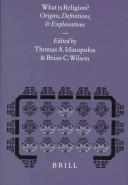
ISSN: 01698834 ISBN: 9004110224 9004379045 9789004110229 9789004379046 Year: 1998 Volume: 81 Publisher: Leiden Brill
Abstract | Keywords | Export | Availability | Bookmark
 Loading...
Loading...Choose an application
- Reference Manager
- EndNote
- RefWorks (Direct export to RefWorks)
What is Religion? consists of fourteen essays written by a selection of scholars who represent a wide spectrum of approaches to the acedamic study of religion. Each of the essays is an effort not only to take stock of the present controversy concerning appropriate methodologies for the study of religion, but also to take one giant step beyond that to formulate a precise definition of religion. Given the considerable confusion today about what it is exactly that religious studies scholars take to be their subject matter when they presume to professionally teachabout religion, this volume provides a much needed forum for leading scholars to debate and clarify what professors of religious studies understand as the central object or objects under their scrunity.
Religious studies --- Religion. --- Religion --- 291.11 --- Religion, Primitive --- Atheism --- God --- Irreligion --- Religions --- Theology --- Godsdienst:--oorsprong; ontwikkeling; natuur --- 291.11 Godsdienst:--oorsprong; ontwikkeling; natuur --- Religious history. --- Study and teaching. --- origins, definitions and explanations of religion --- methodologies for the study of religion --- social formation --- religious plurality --- history of religion --- Theology.
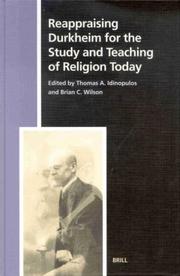
ISSN: 01698834 ISBN: 9004123393 9004379150 9789004123397 Year: 2002 Volume: 92 Publisher: Leiden Brill
Abstract | Keywords | Export | Availability | Bookmark
 Loading...
Loading...Choose an application
- Reference Manager
- EndNote
- RefWorks (Direct export to RefWorks)
Reappraising Durkheim for the Study and Teaching of Religion Today is an occasion to critically analyze and reassess the work of this intellectual pioneer. It is also an effort to signal the continuing importance of Durkheim for today’s graduate and advanced undergraduate classrooms. Reappraising Durkheim brings together ten new critical essays in which noted sociologists, psychologists, phenomenologists, philosophers, and historians of religion grapple with the questions Durkheim raised and the solutions he proposed. Taken together, the volume is a careful historical and multi-disciplinary study of Durkheim that will lead students to a better understanding of how to study religion. Reappraising Durkheim will be an excellent text for courses focusing on theory and method in the academic study of religion at both the graduate and advanced undergraduate level. It would therefore be appropriate for use in departments of religious studies, philosophy, sociology, and anthropology.
Religion and sociology --- Religion --- Sociologie religieuse --- Philosophy --- Philosophie --- Durkheim, Emile, --- Religion and sociology. --- Durkheim, Émile, --- 316.2 DURKHEIM, EMILE --- -Religion, Primitive --- Atheism --- God --- Irreligion --- Religions --- Theology --- Sociologische richtingen. Sociologische scholen. Sociologen--DURKHEIM, EMILE --- Study and teaching --- -Methodology --- Durkheim, Emile --- -Contributions in historiography of religion --- -Sociologische richtingen. Sociologische scholen. Sociologen--DURKHEIM, EMILE --- 316.2 DURKHEIM, EMILE Sociologische richtingen. Sociologische scholen. Sociologen--DURKHEIM, EMILE --- Tʻu-erh-kan, --- Di︠u︡rkem, E., --- Durkheim, David Émile, --- Di︠u︡rkgeĭm, Ėmilʹ, --- Dyurukēmu, Emīru, --- Durkheim, Emilio, --- Dirkem, Emil, --- Study and teaching. --- Durkheim, Émile, - 1858-1917
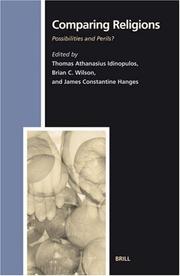
ISSN: 15709434 ISBN: 9004152679 9789004152670 9786611399825 1281399825 9047410408 9789047410409 9781281399823 Year: 2006 Volume: 113. Publisher: Leiden Boston Brill
Abstract | Keywords | Export | Availability | Bookmark
 Loading...
Loading...Choose an application
- Reference Manager
- EndNote
- RefWorks (Direct export to RefWorks)
Comparative religion --- Religion --- Religions. --- Religions --- Methodology. --- Study and teaching. --- Méthodologie --- Etude et enseignement --- -Religion --- -Religions --- 291 --- Denominations, Religious --- Religion, Comparative --- Religions, Comparative --- Religious denominations --- World religions --- Civilization --- Gods --- Religion, Primitive --- Atheism --- God --- Irreligion --- Theology --- Methodology --- Study and teaching --- Godsdienstwetenschap: vergelijkend --- Méthodologie --- Religion - Methodology --- Religion - Study and teaching
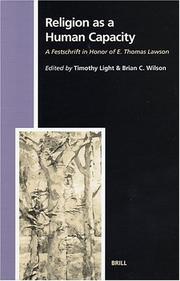
ISSN: 15709434 ISBN: 9004126767 9786610466955 1423712129 1280466952 9047401697 9781423712121 9789047401698 9789004126763 Year: 2004 Volume: 99 Publisher: Leiden Boston, MA Brill
Abstract | Keywords | Export | Availability | Bookmark
 Loading...
Loading...Choose an application
- Reference Manager
- EndNote
- RefWorks (Direct export to RefWorks)
Prepared in honor of E. Thomas Lawson, the essays in Religion as a Human Capacity represent diverse points of view in the study of religion today. Part I, “Theoretical Studies,” offers a broad range of cognitivist theoretical explorations, while Part II, “Studies in Religious Behavior,” presents cutting-edge applications of cognitive and other contemporary theories to religious data. This volume celebrates Lawson’s critical contributions to cognitive studies of religion and the degree to which his ultimate goal of scholarship as a search for truth is matched by those who have been his colleagues and been influenced by him. Religion as a Human Capacity will be of interest to all those concerned with theory and method in the academic study of religion
Religion. --- Religion --- 291 <082> --- Religion, Primitive --- Godsdienstwetenschap: vergelijkend--Feestbundels. Festschriften --- Atheism --- God --- Irreligion --- Religions --- Theology
Book
ISBN: 9780814345306 Year: 2018 Publisher: Detroit Wayne State University Press
Abstract | Keywords | Export | Availability | Bookmark
 Loading...
Loading...Choose an application
- Reference Manager
- EndNote
- RefWorks (Direct export to RefWorks)
John Earl Fetzer (1901-1991) --- biography --- Fetzer Foundation --- parapsychological research --- spiritualism --- theosophy --- freemasonry --- parapsychology --- New Age --- ufology --- Seventh-day Adventism --- divination --- hermeticism --- rosicrucianism --- Helena Petrovna Blavatsky (1831-1893) --- UFOs --- channeling
| Listing 1 - 8 of 8 |
Sort by
|

 Search
Search Feedback
Feedback About UniCat
About UniCat  Help
Help News
News